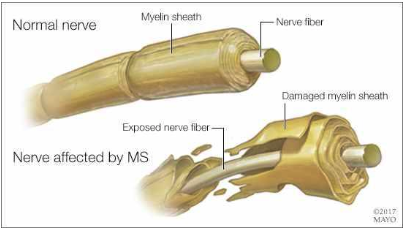Multiple Sclerosis By Naomie Natasha

What is Multiple Sclerosis
Multiple sclerosis (MS) is an autoimmune disease that affects the central nervous system; the brain and the spinal cord. MS attacks myelin, the covering of nerve fibers and this leads to communication problems in the body between the brain and body parts (1). Eventually, multiple sclerosis can deteriorate the nerves or cause permanent damage.
MS is an immune mediated disorder. Normally, the immune system is there to protect our bodies but with multiple sclerosis, it mistakenly attacks nerves that are vital to everyday function.
Signs and Symptoms of Multiple Sclerosis
Have you felt weak lately? The first thing you probably did was to do a quick search on the internet and discovered you had same symptoms with the alarming disease of MS. Before you begin to worry, it is important to note that multiple sclerosis signs and symptoms are the same as some other diseases.
Most people tend to have the symptoms between the ages 20-40 and they come and go or can get worse over time (2). The common signs and symptoms of MS include the following:
-pains and spams
-bladder issues
-Vision problems
-weakness and fatigue
-cognitive problems
-balance problems and sexual dysfunction
Its symptoms can vary in intensity. Severe cases of multiple sclerosis cause vision loss, paralysis or even diminished brain function.
Vision Problems
This is one of the most common symptoms of multiple sclerosis. One of the nerves that are attacked by MS is the optic nerve and the inflammation disrupts vision. This causes double vision, blurred vision and even loss of vision.
Vision problems may not be noticed immediately but you may experience pain when you look to one side. Degeneration of clear vision is slow with MS.
Tingling and Numbness
Multiple sclerosis affects the body’s message center; that is, the nerves in the spinal cord and brain. This results in the body receiving conflicting signals or not receiving signals at all causing numbness.
Not feeling anything or numbness is the most common sign of multiple sclerosis and most places in the body to feel this is the legs, face, fingers and arms (4).
Pain and Muscle stiffness
Pain is common with multiple sclerosis. Multiple studies have shown that half of people with MS have chronic pain (4). Muscle stiffness is also a sign of MS and the legs are the most affected.
Weakness and Fatigue
Weakness and fatigue occur due to nerves deteriorating in the spinal column. The fatigue can last for weeks if not cared for.
Dizziness
This is another symptom of multiple sclerosis where people with this disease feel lightheaded and dizzy especially when they stand up.
Cognitive Problems
After the body’s message center is attacked by MS, cognitive problems are likely to develop. Half of people with multiple sclerosis develop cognitive problems and they include memory problems, difficulty staying organized, shortened attention span and language problems.
Sexual dysfunction
Central nervous system plays an important role in sexual arousal. If it is attacked, people with MS disease experience sexual problems.
Diagnosis
Several tests are done by a doctor to diagnose MS and include the following;
Neurological exam to determine if you have an impaired nerve function
Eye exam to check for vision problems
MRI (magnetic resonance imaging) test is done to create images of the spinal cord and brain.
Spinal tap is a test done to multiple sclerosis patients to check a sample of spine fluid. All these tests are done to determine if your central nervous system has been attacked by MS or not.
See your doctor immediately if you experience sudden numbness on one side of your body and vision problems. Make an appointment with your doctor also if your symptoms last for more than a day (5).
Causes of MS
The cause of MS is not known but it is an autoimmune disease. With autoimmune disease, the body immune systems attack its own tissues and cells causing malfunction in the central nervous system in the case of multiple sclerosis.
Combinations of environmental and genetic factors have been speculated to be responsible for triggering MS in some people. They include;
Certain Infections; some viruses like Epstein-Barr have been linked to trigger multiple sclerosis disease.
Autoimmune diseases; people with other autoimmune diseases have a higher risk of developing MS. Diseases such as type 1 diabetes and inflammatory bowel disease could put someone at a risk of getting MS.
Family History; you are likely to develop MS if one of your family members i.e. your parents or siblings had MS before.
Treatment of Multiple Sclerosis
There is no cure for MS. Treatment will focus on managing multiple sclerosis symptoms, recovery from attack and slowing the progression of the disease.
Corticosteroids are administered to reduce nerve inflammation. They include prednisone and methylprednisolone.
Plasmapheresis or plasma exchange is done if symptoms are severe and your body has not responded to steroids.
Beta interferons; these are one of the medications commonly prescribed to treat multiple sclerosis. They are injected into the body muscles or under the skin to reduce the severity of relapses of MS.
Mitoxantrone; a person suffering from severe multiple sclerosis maybe prescribed this immune suppressant drug to reduce the attack of the disease.
Other medications given to block immune system attack include Glatiramer Acetate which is injected beneath the skin. Someone might experience skin irritation at the site of injection.
Physical therapy: stretching and exercises are important to help manage legs weakness. It is also good to use mobility aid in order to walk properly and perform daily tasks.
Muscle relaxants; muscles relaxants are of a great help in relaxing stiff muscles. One of the symptoms of MS is uncontrollable muscles stiffness especially on legs and this can be put under control by use of muscle relaxants such as tizanidine and baclofen (6).
If you can, get plenty of rest especially when you feel weak and fatigued. Regular exercises such as walking, swimming, stretching and aerobics will improve your strength and coordination.
Eating a balanced diet with fruits and vegetables may be beneficial in improving your health. Avoid smoking and heat which may worsen the symptoms of MS.
References
- Fatigue. (n.d.).
nationalmssociety.org/Symptoms-Diagnosis/MS-Symptoms/Fatigue - Mayo Clinic Staff. (2017). Multiple sclerosis.
mayoclinic.org/diseases-conditions/multiple-sclerosis/symptoms-causes/syc-20350269 - OHSU study: Misdiagnosis of MS is costing health system millions per year. (2012).
news.ohsu.edu/2012/05/09/ohsu-study:-misdiagnosis-of-ms-is-costing-health-system-millions-per-year - Pain. (n.d.).
nationalmssociety.org/Symptoms-Diagnosis/MS-Symptoms/Pain - Thompson AJ, et al. (2017). Diagnosis of multiple sclerosis: 2017 revisions of the McDonald criteria. DOI:
10.1016/S1474-4422(17)30470-2 - Who gets MS (epidemiology)? (n.d.).
nationalmssociety.org/What-is-MS/Who-Gets-MS
